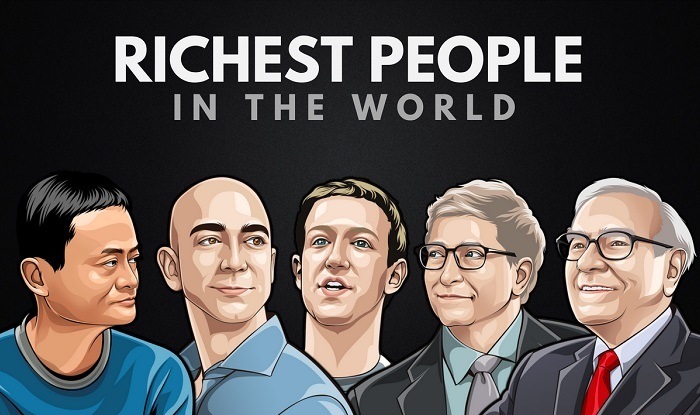The richest people on Earth lost US$511 billion ($760.1b) this year after record first-half gains were obliterated by a succession of bruising market selloffs.
Global trade tensions and worries about a US recession dragged markets lower at year-end, leaving the 500 people on the Bloomberg Billionaires Index with a combined net worth of US$4.7 trillion as of Friday’s close.
It’s only the second annual decline for the daily wealth index since its 2012 debut, and represents a sharp about-turn from the start of the year, when bullish investors helped propel the fortunes of the richest to a record US$5.6t.
“As of late, investor anxiety has run high,” said Katie Nixon, chief investment officer at Northern Trust Wealth Management. “We do not expect a recession, but we are mindful of the downside risks to global growth.”
Even Jeff Bezos, who recorded the biggest gain for 2018, wasn’t spared the volatility. His fortune peaked at US$168b in September, a US$69b gain. It later tumbled US$53b – more than the market value of Delta or Ford – to leave him with US$115b at year-end.
The Amazon.com founder had a better year than Mark Zuckerberg, who recorded the biggest loss since January, dropping US$23b as Facebook Inc. careened from crisis to crisis. Overall, the 173 US billionaires on the list – the largest cohort – lost 5.9 per cent from their fortunes to leave them with US$1.9t.
Even Asia’s fabled wealth-creation machine stumbled as the region’s 128 billionaires lost a combined US$144b in 2018. The three biggest losers in Asia all hailed from China, led by Wanda Group’s Wang Jianlin, whose fortune declined US$11.1b.
Despite the turmoil, Asia continued to mint new members of the three-comma club. The Bloomberg index uncovered 39 new members from the region in 2018, although that status proved short-lived for some. About 40 per cent had lost their 10-figure status as of December 7.
The Middle East had an even more turbulent year. While many of the billionaires ensnared in Saudi Crown Prince Mohammed bin Salman’s corruption crackdown were released, doubt and fear about the powerful royal’s methods sent a chill through the Saudi economy.
The Kingdom’s richest person, Prince Alwaleed, who was released in March after 83 days in detention, lost US$3.4b. His net worth has fallen by 60 per cent since its peak in 2014. One of the remaining Saudi captives, Mohammed Al Amoudi, managed to become richer during his year in detention, as the value of his Swedish energy and property assets rose. The Saudi government confirmed this month that he was facing charges on graft and corruption and is awaiting trial. Meanwhile, Africa’s richest saw their fortunes shrink by 14 per cent as the emerging-market rout hammered assets.
From Zara founder Amancio Ortega to former Italian Prime Minister Silvio Berlusconi, most of Europe’s billionaires saw their fortunes fall. Germany’s Schaeffler family, the majority shareholders of car-parts maker Continental AG, lost the most as extra costs and tough business conditions in Europe and Asia hampered the company’s performance.
Georg Schaeffler and his mother Maria-Elisabeth Schaeffler-Thumann are US$17b worse off than at the start of the year. That sum alone would place them among the world’s 100 richest people.
Mexico’s Carlos Slim, the majority shareholder of Latin America’s largest mobile-phone operator, also suffered big losses. Once the world’s richest person, Slim now ranks sixth with a US$54b pile. 3G Capital co-founder Jorge Paulo Lemann saw his fortune drop the most among Latin American billionaires, losing US$9.8b. But even with that fall, he remains Brazil’s richest person.
Russian fortunes on average fared better. The volatility caused by collapsing oil prices, a flare-up in tensions with Ukraine and tightening sanctions was partially offset by periodic gains. The combined net worth of the country’s 25 wealthiest people was down only slightly, ending at US$255b, according to the ranking.
Still, 16 of the 25 Russian billionaires on the Bloomberg index saw their net worth fall in 2018. Aluminum magnate Oleg Deripaska, who remains under US sanctions, lost the most – US$5.7b – and dropped out the Bloomberg ranking of the world’s top 500 richest people.
By contrast, energy moguls Leonid Mikhelson, Gennady Timchenko and Vagit Alekperov added a total of US$9b. Timchenko, sanctioned in 2014, added 27 per cent to his net worth as shares of gas producer Novatek rose 40 per cent.
Those gains were the main reason why energy billionaires as a group had the best year, adding a collective US$6b. Technology fortunes – the best performing in 2017 after climbing US$262b – were down a total of US$55b, even including Bezos’s gain. All other industries were down, including a US$75b decline for retail tycoons and a US$79b drop for industrialists.
The number of women on the list inched up by one to 66 as Denise Coates, the British founder and chief executive officer of online bookmaker Bet365 Group Ltd., joined the ranking for the first time. She pocketed £220 million ($413.7m) in remuneration last year, one of the highest disclosed pay packages anywhere, after the company reported record results.
Credit: newstalkzb.co.nz




